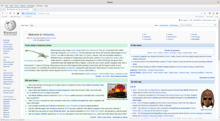This article may rely excessively on sources too closely associated with the subject, potentially preventing the article from being verifiable and neutral. (July 2018) |
 | |
 Screenshot of the Beaker browser on Fedora 31 | |
| Developer(s) | Blue Link Labs.[1] |
|---|---|
| Initial release | 1 August 2017 |
| Stable release(s) | |
| Preview release(s) | |
| Repository | |
| Operating system | Linux, Microsoft Windows, macOS |
| Platform | x86-64 |
| Type | Open-source web browser |
| License | MIT License |
| Website | beakerbrowser |
Beaker is a discontinued[4] free and open-source web browser[5] developed by Blue Link Labs.[6][7] Beaker Browser peer-to-peer technology allows users to self-publish websites and web apps[8] directly from the browser, without the need to set up and administrate a separate web server or host their content on a third-party server. All files and websites are transferred using Dat, a hypermedia peer-to-peer protocol, which allows files to be shared and hosted by several users.[9] The browser also supports the HTTP protocol to connect to traditional servers.[5]
Beaker is built using the Electron framework and therefore uses the Chromium browser as a renderer for webpages.[10]
- ^ "Beaker is a more powerful browser, for a more powerful Web". Beaker browser. Retrieved 24 Jul 2018.
- ^ "Beaker Browser 1.1". Blue Link Labs. 2020-12-08. Retrieved 2021-01-25.
- ^ "Beaker 1.0, Beta 4". beaker browser Blog. 2020-06-04. Retrieved 2020-06-05.
- ^ "Is Beaker still being worked on?". Beaker GitHub thread. Retrieved 2022-08-20.
- ^ a b Faife, Corin (13 July 2017). "A New Browser Is Making Peer-to-Peer Web Hosting More User-Friendly". Vice.
- ^ "Blue Link Labs". bluelinklabs.com. Archived from the original on 2019-01-16. Retrieved 2018-07-24.
- ^ "beakerbrowser/beaker". GitHub. Retrieved 2018-07-24.
- ^ "Peer-to-peer Web applications". beakerbrowser.com. Retrieved 2019-07-31.
- ^ "Dat Protocol". www.datprotocol.com. Retrieved 2018-07-24.
- ^ "Project of the Week: Beaker Browser | Electron Blog". electronjs.org. 7 February 2017. Retrieved 2018-07-27.